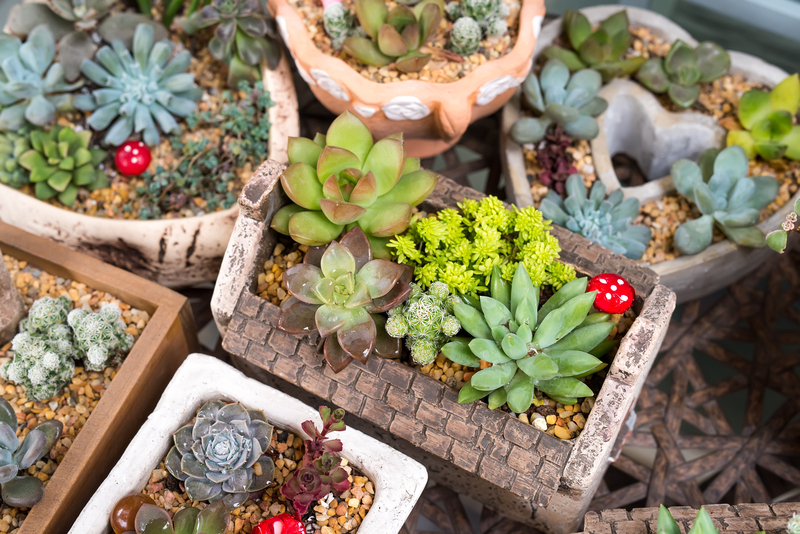Effective Strategies for Tackling Weeds in Your Garden
Posted on 30/08/2025
Effective Strategies for Tackling Weeds in Your Garden
Weeds can wreak havoc in a beautifully maintained garden, robbing your prized plants of essential nutrients, water, and sunlight. Whether you are a seasoned horticulturist or an amateur enthusiast, learning how to combat and control weeds is crucial to maintaining a thriving outdoor space. In this comprehensive guide, you'll discover proven, effective strategies for tackling weeds in your garden, ensuring your landscape remains healthy and vibrant all season long.
Understanding the Enemy: What Are Garden Weeds?
Before you begin your weed-control campaign, it's critical to understand what exactly weeds are and why they pose such a threat to your garden. In the simplest terms, a weed is any plant that grows where it isn't wanted. These opportunistic invaders can quickly spread, overtaking garden beds and stealing vital resources from your ornamental or edible plants.
- Annual Weeds: Germinate and complete their life cycle within one year (e.g., crabgrass, chickweed).
- Perennial Weeds: Live for several years, often regrowing from roots (e.g., dandelion, bindweed).
- Biennial Weeds: Require two years to complete their lifecycle (e.g., garlic mustard, burdock).
Identifying the type of weed you're up against will help you deploy the most effective weed-control strategies--tailored solutions for annuals, perennials, and biennials tend to yield the best results.

Why It's Essential to Control Weeds
Weeds in your garden don't merely mar aesthetics; they also:
- Compete aggressively for water, nutrients, and sunlight.
- Host pests and pathogens harmful to garden plants.
- Reduce crop yields in vegetable gardens.
- Spread rapidly, increasing future management challenges.
Therefore, effective strategies for tackling weeds in your garden are not just a matter of appearance--they're essential for plant health and orchard success.
Top Strategies for Tackling Weeds in Your Garden
1. Hand Weeding: Tried and True
Sometimes, the old-fashioned way is the best. Hand-pulling is highly effective for small infestations and newly sprouted weeds. It's especially crucial to remove weeds before they set seed, preventing future generations from taking hold.
- Water the soil beforehand to make pulling weeds easier and reduce root breakage.
- Use a hand fork or weeding tool for stubborn perennials like dandelions.
- Wear gloves to protect your hands from thorns or skin irritants.
Tip: This method is most effective when incorporated into your regular garden routine, catching weeds before they multiply.
2. Mulching: Smothering the Competition
Mulching is among the most effective methods for tackling weeds in your garden. A thick layer of mulch blocks sunlight, inhibiting weed seed germination while enriching your soil and retaining moisture for your desired plants.
- Organic mulches: Compost, shredded bark, straw, or grass clippings add nutrients as they break down.
- Inorganic mulches: Landscape fabric or black plastic provide longer-lasting weed suppression.
Apply mulch at least 2-3 inches deep for optimum weed hindrance. Replenish as needed to maintain coverage.
Bonus: Organic mulch not only tackles weeds, but also encourages beneficial organisms and improves soil structure.
3. Cultivation: Disrupting the Seed Bank
Frequent cultivation physically disrupts weed growth by uprooting seedlings before they mature. Shallow cultivation is ideal--turning the soil too deeply may bring dormant weed seeds to the surface where they'll germinate.
- Use a hoe or cultivator shortly after rainstorms when weeds are easiest to remove.
- Follow up with mulch to prevent new seeds from taking hold.
Be mindful--over-cultivating can damage the roots of your crops or ornamentals. Precision counts!
4. Plant Spacing and Dense Planting
Strategic spacing and dense planting can naturally outcompete weeds for resources and sunlight. By leaving as little bare soil as possible, you make it difficult for weeds to establish themselves.
- Use ground covers like creeping thyme between stepping stones or beds.
- Plant vegetables or flowers close enough to shade out weed seedlings, but allow for air circulation to prevent disease.
This is a highly sustainable and eco-friendly weed control strategy.
5. Employing Landscape Fabric and Barriers
Landscape fabrics and physical barriers provide a long-term solution for persistent weed issues. By placing a permeable fabric over garden beds and topping with mulch, you create a formidable obstacle against even the most stubborn weeds.
- Cut holes for your desired plants and secure with pins.
- Works especially well in permanent beds or under gravel pathways.
Note: Some determined weeds, like bindweed, may find their way through or around barriers, so routine inspection is essential.
6. Using Organic Herbicides
Organic or natural herbicides offer an environmentally friendly alternative to synthetic chemicals. Products containing acetic acid (vinegar) or natural fatty acids can control young weeds effectively.
- Best used for spot treatments on driveways and patios or for small outbreaks.
- Be cautious--organic herbicides are non-selective and will damage any plant tissue they contact.
Always read and follow label instructions to ensure safe and effective use.
7. Solarization: Harnessing the Power of the Sun
In areas with severe weed problems, garden solarization is an effective strategy for weed eradication. By covering soil with clear plastic for 4-6 weeks during hot weather, you trap heat and solar radiation, essentially "cooking" weed seeds and pathogens in the upper soil layers.
- Moisten the soil thoroughly before covering.
- Secure plastic edges with soil, bricks, or stakes.
- Remove plastic before planting desired crops.
Solarization is ideal before establishing new beds or in vegetable gardens with frequent crop rotation.
8. Cultivating a Healthy Lawn
Weeds often thrive in thin, patchy, or stressed lawns. Promoting vigorously growing, healthy grass is an excellent long-term weed management strategy.
- Mow at the recommended height for your grass type to shade out weed seedlings.
- Water deeply but infrequently to encourage deep roots.
- Fertilize appropriately to maintain turf vigor and density.
Thick, well-maintained turf is your lawn's first line of defense in the battle against weeds.
Prevention: The Key to Sustainable Weed Management
Once you get weeds under control, prevention is your best weapon for future seasons. Here are the top preventive strategies for reducing weed pressure in your garden:
- Regular Monitoring: Regularly inspect your garden for early signs of weeds, and act quickly to remove them.
- Quality Compost: Use only well-composted material to prevent the introduction of fresh weed seeds.
- Clean Tools: Always clean tools and equipment when moving between infested and weed-free areas.
- Edge Your Garden Beds: Physically edging beds prevents grass and creeping weeds from infiltrating ornamental areas.
Integrated weed management is a combination of these preventive and corrective actions for the best results.
Choosing the Best Weed Control Method for Your Garden
There is no one-size-fits-all approach to tackling weeds in your garden. Each garden is unique, and the most effective weed control solutions will depend on:
- The types of weeds present
- The size of your garden
- Your plant selection
- Available time and resources
Combining multiple methods--as described above--is often the most successful strategy. For example, mulching can be paired with occasional hand-pulling, while dense planting reduces the frequency of cultivation needed. Monitor your garden regularly and adjust techniques based on current weed pressures and plant needs.
Common Mistakes in Garden Weed Control
- Ignoring small weeds: Minor outbreaks can quickly escalate if not addressed promptly.
- Tilling deeply: Excessively disturbing the soil can bring more weed seeds to the surface.
- Allowing weeds to go to seed: Even one mature plant can shed thousands of seeds for next year.
- Using contaminated compost or mulch: Inadequately composted organic matter can introduce new weeds.
- Overusing herbicides: Relying solely on chemicals leads to resistance and can harm soil health and pollinators.
By understanding and avoiding these common errors, you'll improve the effectiveness of your weed management methods.
Eco-Friendly and Organic Solutions for Weed Control
If you are passionate about organic gardening, rest assured--there are plenty of sustainable ways to control weeds without resorting to harsh chemicals. Natural weed control strategies include:
- Flame weeders: These devices pass a quick burst of flame over small weeds, causing cellular damage and eventual death (best for paths, not beds).
- Boiling water: Pouring boiling water directly on weeds is an eco-friendly way of dealing with weeds in cracks or patios.
- Natural smother crops: Sowing buckwheat, clover, or rye in fallow beds can outcompete weeds and improve soil.
Remember, the most eco-friendly garden weed management practice is persistent, manual removal timed before seed production.
Summary: Mastering the Art of Weed Control
Effective weed management in the garden is a continuous endeavor. Combining physical strategies (like hand-pulling and mulching) with preventive techniques (like dense planting and routine monitoring) can significantly reduce weed pressure and save time and effort in the long run.
To recap, the most successful strategies for weed control include:
- Identifying and targeting weed types
- Employing regular hand weeding and mulching
- Using cultivation and barriers where appropriate
- Implementing sustainable lawn care practices
- Preventing new weed infestations through cleanliness and vigilance
By incorporating these effective strategies for tackling weeds in your garden into your routine, you'll create a healthier, more beautiful, and more productive outdoor space--free from the relentless attack of unwanted weeds.

Frequently Asked Questions About Garden Weed Control
How often should I weed my garden?
Regular weeding is vital: aim for at least once a week during peak growing seasons. Frequent maintenance prevents weeds from seeding and spreading.
Can I compost pulled weeds?
You can compost weeds, but avoid including seed-bearing or persistent-root weeds unless you're certain your compost pile reaches temperatures hot enough to destroy seeds and roots.
What's the best mulch for weed control?
Both organic (shredded bark, straw) and inorganic (woven fabric, black plastic) mulches are effective. Choose based on your gardening style and plant needs.
Are chemical herbicides safe?
When used according to the label, chemical herbicides can be a tool for spot-treating tough weeds. However, always consider environmentally friendly options and use them as a last resort, especially in edible gardens.
Why do weeds keep coming back?
Weeds are persistent because many have long-lived seeds that remain viable in the soil for years. Consistent and targeted control will gradually decrease the weed seed bank in your soil.
Take Action: Step Into a Weed-Free Garden
Don't let weeds overrun your garden paradise! By implementing these effective weed-control strategies, you can reclaim your beds and borders--creating a lush, productive, and weed-free outdoor oasis.
Latest Posts
Safeguarding Your Garden Against Extreme Weather Conditions
Discover the Top 9 Hedges for Rapid Privacy Growth
Transform Your Outdoor Space with Tranquil Zen Garden Ideas

